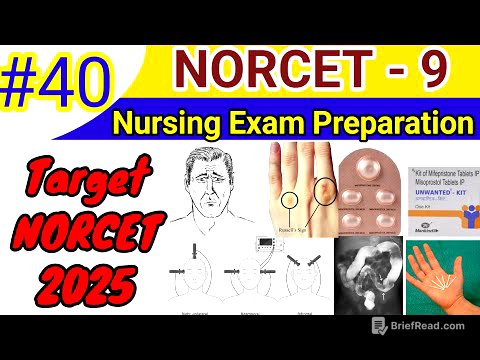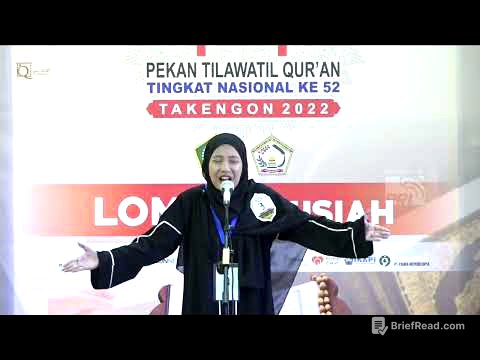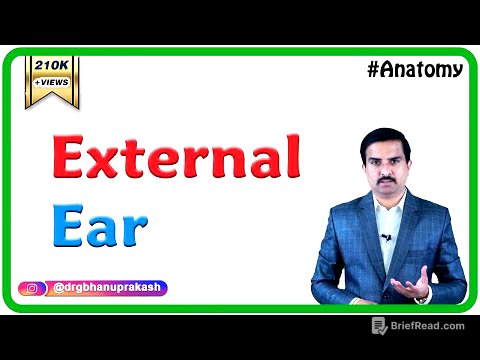TLDR;
This video provides a comprehensive revision of important questions related to becoming an LIC (Life Insurance Corporation) agent. It covers a range of topics including insurance principles, policy features, legal aspects, and customer service. The presenter emphasizes understanding the questions rather than memorizing them to improve exam performance.
- Key insurance concepts and principles explained through multiple-choice questions.
- Focus on practical application of knowledge in real-world scenarios.
- Tips for exam preparation and understanding the nuances of insurance policies.
Introduction [0:00]
The video introduces a revision session focusing on important questions for individuals preparing to become LIC agents. It encourages viewers to subscribe to the channel and enable notifications for updates. The presenter also offers a PDF of the questions, accessible by commenting or contacting the provided WhatsApp number.
Question 1: Mutuality and Differentiation [0:27]
The video starts with a question asking to identify the wrong statement regarding mutuality and differentiation in the context of funds. Mutuality refers to combining funds from different persons, while differentiation involves channeling money to different sources. The correct answer is that both statements are correct, making "none of the above" the right choice.
Question 2: Types of Assurance [1:00]
The next question asks which of the given options is not a type of assurance. The options include mortgage redemption insurance, return of premium, increase tenure assurance, and assure endowment. Viewers are encouraged to provide the correct answer in the comments to receive a free PDF.
Question 3: Consumer Grievance Redressal Agencies [1:37]
This question focuses on which consumer grievance redressal agency handles disputes between ₹20 lakh and ₹100 lakh. The options are District Forum, State Commission, National Commission, and District Council. The correct answer is the State Commission, which handles disputes within the specified amount range.
Question 4: Basis of Cover in a Group Policy [2:21]
The question asks which factor can be the basis of cover in a group policy. The options include the height of life insured, the age of the person insured, the size of the family of the insured, and all of the above. The correct answer is the age of the person insured.
Question 5: Principle of Averima Fides [3:12]
This question tests the understanding of the principle of Averima Fides (utmost good faith). The options include lying about known medical conditions, not disclosing known material facts, disclosing material facts at the time of taking the policy, and paying the premium on time. The correct answer is disclosing the material facts at the time of taking the policy.
Question 6: Value of Benefits in ULIPs [3:59]
The question addresses the value of benefits in the initial years of Unit Linked Insurance Plans (ULIPs). The options are high, less, liberal, and none of these. The correct answer is less, as the value of benefits is typically lower in the early years of a ULIP due to initial charges and market fluctuations.
Question 7: Impact of Savings [5:00]
This question asks at what stage in one's life savings will have the most impact. The options are retirement, while earning, while a student, and when married. The correct answer is retirement, as savings are most crucial for financial security during retirement.
Question 8: Disadvantages of Traditional With-Profit Policies [5:34]
The question identifies a disadvantage of traditional with-profit policies. The options include the bonus being declared only once a year, benefits depending on the discretion of the insurance company, the bonus structure not reflecting the true value of the insurer's assets, and all of the above. The correct answer is all of the above, as these are common drawbacks of traditional policies.
Question 9: Traditional Cash Value Plans [6:13]
This question asks to identify the incorrect statement regarding traditional cash value plans. The correct answer is that the cash value component is well defined.
Question 10: Representation by an Insurance Broker [6:42]
The question asks who an insurance broker represents. The options are an insurance company, an insured person, an association of insurance companies, and people in the community who have already taken insurance. The correct answer is an insured person.
Question 11: Elements of a Valid Contract [7:33]
This question focuses on the elements of a valid contract, asking which of the given options is not an element. The options are offer and acceptance, ability to pay premiums, consideration, and capacity of the parties. The correct answer is ability to pay premiums.
Question 12: Nature of an Insured Incident [8:11]
The question describes the nature of an insured incident, stating that the occurrence must be uncertain and the person affected must not have creation. The correct answer is crisis, uncertain, creation.
Question 13: First Part of the Policy Document [9:02]
This question asks what the first part of a policy document is. The options are policy claim settlement, Policy Schedule, standard provisions, and specific policy provisions. The correct answer is Policy Schedule.
Question 14: IRDA Guidelines Implementation [9:44]
The question asks about the implementation date of IRDA's public health guidelines. The options are 1st July 2011, 1st July 2012, 1st July 2013, and 1st July 2014. The correct answer is 1st July 2014.
Question 15: Right to Reject a Claim [10:35]
This question refers to the section of the Insurance Act, 1938, that governs the right to reject a claim under a policy. The options are section 38, section 39, section 44, and section 45. The correct answer is section 45.
Question 16: Risk Retention in Insurance [11:30]
The question defines risk retention in the context of insurance. The correct answer is where the buyer decides to bear the risk and its effects.
Question 17: Stand-Alone Health Insurance Company [12:06]
This question defines a stand-alone health insurance company. The correct answer is a general insurance company which sells only health products.
Question 18: Premium and Benefits [12:50]
The question explores the relationship between premium and benefits. The correct answer is that a higher premium will give more benefits to the beneficiary at the time of claim.
Question 19: Incorrect Statement About Insurance Agents [13:33]
This question asks to identify the incorrect statement. The correct answer is that an agent today can work for more than one life insurance company.
Question 20: Real Test for an Insurance Company [14:21]
The question asks when an insurance company is put to the real test. The correct answer is while declaring the bonus.
Question 21: Revival of Policy [14:56]
The question states that the revival of the policy is not a requirement of the policyholder. The correct answer is unconditional.
Question 22: Interest on Delayed Claims [15:27]
This question addresses the interest rate applicable if a claim cannot be settled due to proper identification of the payee. The correct answer is Savings Bank Account.
Question 23: Expanding IGMS [15:58]
The question asks to expand the acronym IGMS. The correct answer is Integrated Grievance Management System.
Question 24: Insurable Interest [16:16]
This question asks in which case insurable interest does not exist. The correct answer is that a person insures his associate.
Question 25: Policy for an Indefinite Period [16:43]
The question asks what a policy that covers for an indefinite period is called. The correct answer is entire life.
Question 26: Free Look Period for Health Insurance [17:01]
This question asks how much free look period is allowed from the date of receipt of a health insurance policy document. The correct answer is 15 days.
Question 27: Not Risky for Insurance [17:34]
The question asks which of the following is not risky for insurance. The correct answer is the natural wear and tear of a property.
Question 28: False Statements [18:07]
This question asks which of the following statements is false. The correct answer is all of the above.
Question 29: Insurable Interest in General Insurance [19:00]
This question asks when insurable interest should be present in a general insurance contract as per the common law. The correct answer is one and two.
Question 30: Correct Statements [19:35]
This question asks which of the following statements is correct. The correct answer is statement A only.
Question 31: Investment Vehicle [20:14]
This question asks selecting an appropriate investment vehicle will not depend on that. The correct answer is insurance.
Question 32: Terminal Bonus [20:36]
This question asks whether distribution of terminal bonus is a way out for insurance companies. The correct answer is both one and two.
Question 33: Investment in Equities [21:08]
This question asks which of the following funds provides for principal investment in equities. The correct answer is equity fund.
Question 34: Amount of Devski [21:43]
This question asks on which of the following does the amount of Devski depend. The correct answer is all.
Question 35: Unit Liquid Policy Score [22:13]
This question asks Unit Liquid Policy Score Regarding Traditional Plan. The correct answer is all of the above.
Question 36: IRDA [22:56]
This question asks as per IRDA all are known as universal biological products. The correct answer is variable insurance product.
Question 37: Moral Hazard Report [23:20]
This question asks by whom is the moral hazard report completed. The correct answer is the company officials.
Question 38: MWP Act Cases [23:58]
This question asks which of the following is true regarding MWP Act cases. The correct answer is that death claims are decided in favor of the trustees.
Question 39: Insurance Act [24:19]
This question asks as per Section 45 of the Insurance Act 1938 an insurance company. The correct answer is fraudulently.
Question 40: Monetary Transaction [25:01]
This question asks refers to the act of inducing a monetary transaction by means of inducing the purchase of a product or service. The correct answer is to sell.
Question 41: Earned Income [25:49]
This question asks if the surplus has not been distributed. The correct answer is the financial stability of a company.
Question 42: ULIP [26:27]
This question asks which of the following is not correct regarding ULIP. The correct answer is that the life insurer provides guarantee for the units.
Question 43: Insurance and Gambling [26:49]
This question asks due to any presence insurance is not gambling. The correct answer is insurable interest.
Question 44: Life Insurance Policies [27:19]
This question asks which of the following life insurance policies pays the full sum assured on the death of the policyholder during the policy term or on the policyholder's death as per the policy's maturity. The correct answer is Akshay Nidhi.
Question 45: Riders [27:40]
This question asks which of the following statements regarding riders in it is incorrect. The correct answer is Rider means the basic death cover of a life insurance policy.
Question 46: Nominee [28:08]
This question asks where more than one nominee is nominated. The correct answer is jointly the claim of death is silent.
Question 47: Year [28:42]
This question asks what does the year relate to. Viewers are encouraged to provide the correct answer in the comments to receive a free PDF.
Question 48: Lokpal [29:13]
This question asks which of the following statements is correct. The correct answer is that Lokpal is not a judicial power.
Question 49: Act [29:30]
This question asks which Act speaks about the presumption of death. The correct answer is Indian Evidence Act.
Question 50: Underwriting [29:53]
This question asks in this method of underwriting the underwriter gives rating points for all the negative or unfavorable cars.









